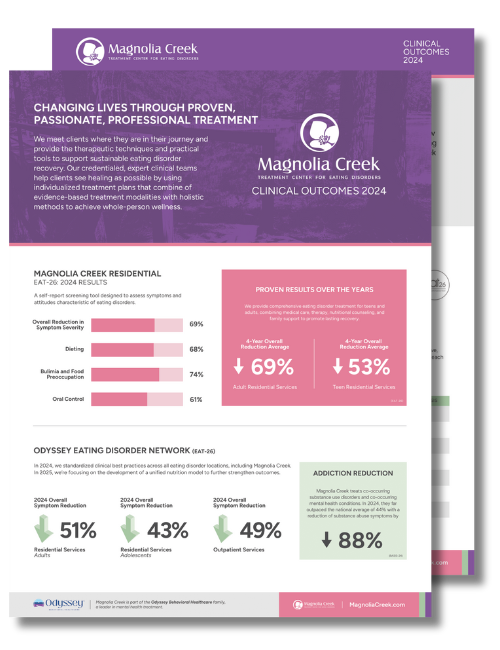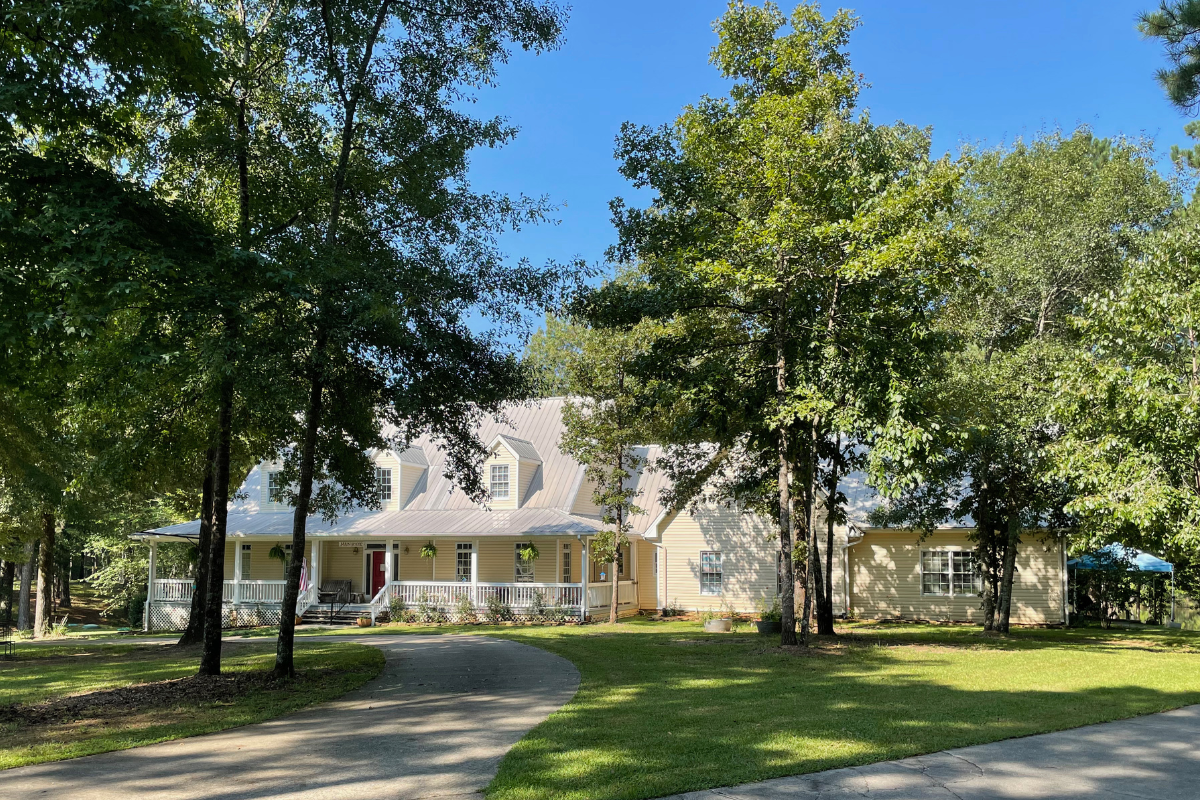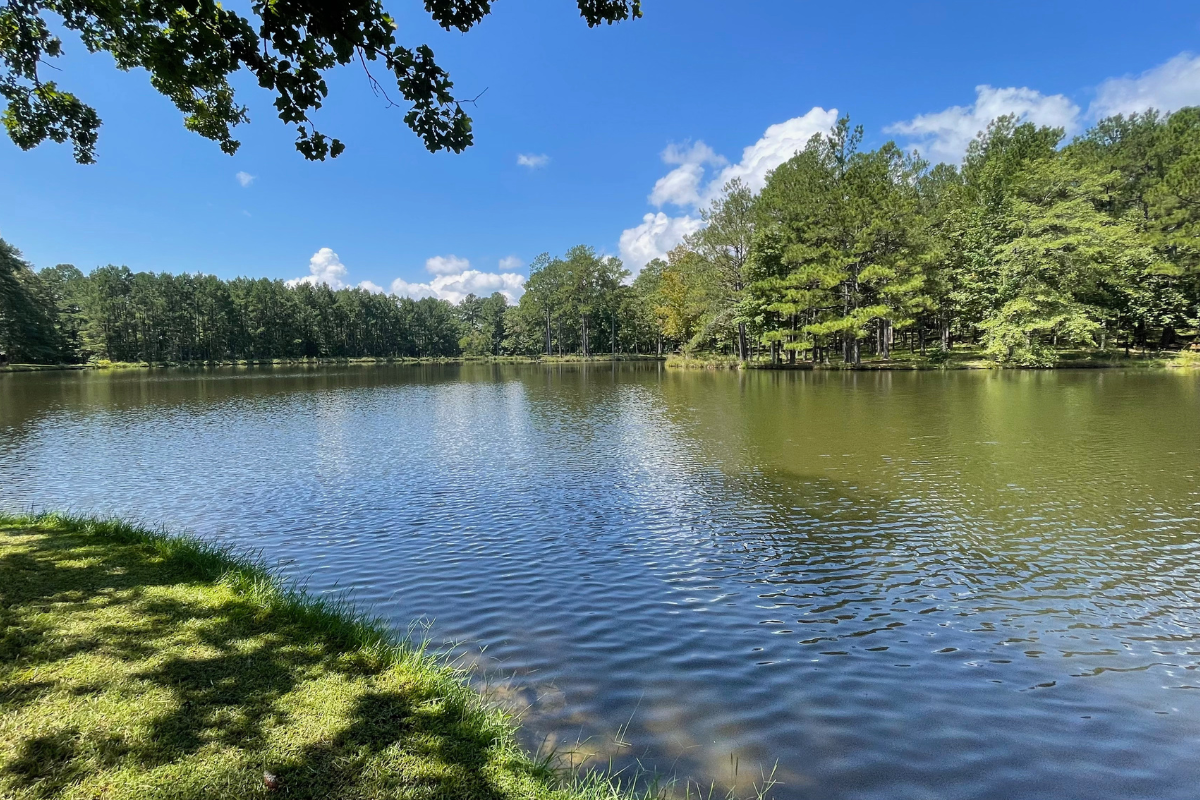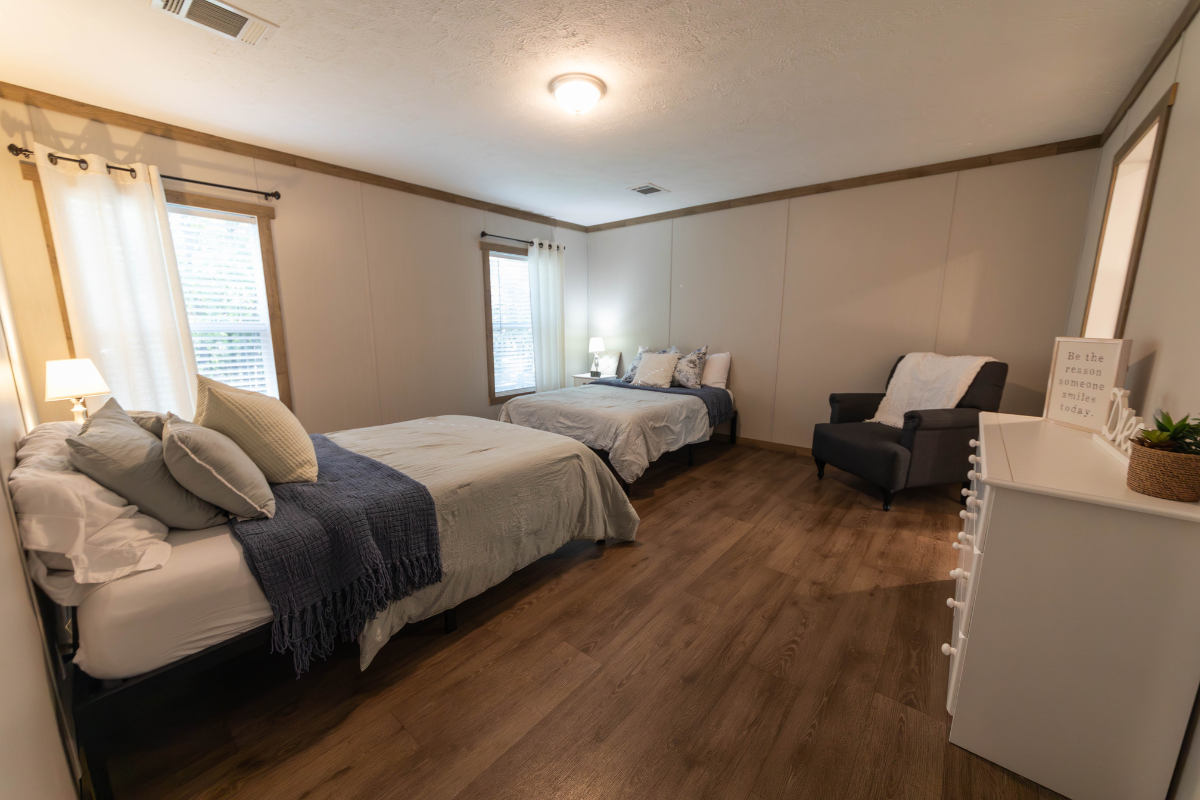A sanctuary for healing + hope
Find peace, purpose, and eating disorder recovery at Magnolia Creek — where compassionate, evidence-based care meets the healing power of nature.
Magnolia Creek
A sanctuary for healing + hope
Comprehensive eating disorder treatment for adolescent girls + adult women
Recover your life, restore your health
Magnolia Creek is a premier eating disorder treatment center near Birmingham, Alabama. We offer personalized care for adolescent and adult females (ages 12+) in a peaceful 36-acre nature-filled setting ideal for connection, reflection, and recovery.

Discover how Magnolia Creek bridges the treatment gap for eating disorders with compassionate, individualized care for women and girls.
Specialized care for adult women, ages 18+
Specialized care for adolescent girls, ages 12–17
Flexible payment options
Magnolia Creek strives to make treatment accessible by offering a number of payment options and working closely with each client to find a payment method that meets their needs.
In-network insurance providers:
- Aetna
- Behavioral Health Systems
- BlueCross BlueShield (BCBS)
- Cigna
- Humana
- Multiplan
- PHCS
- Quest Behavioral Health
- TRICARE (certified non-network)
- VIVA Health
- United Heathcare
We accept most major insurance providers, work with select out-of-network plans, and offer reduced rates for private-pay clients. Please note that we do not accept Medicaid or Medicare.




Step into healing at your own pace.
With compassion and connection at their core, our residential treatment and partial hospitalization programs help clients build resilience and independence for lasting recovery.
24/7 live-in care for teen and adult females, designed to restore health and build a foundation for lasting recovery.
Structured “daytime” support for teen and adult females that helps build confidence and practical skills for navigating everyday life.
What We Treat
At Magnolia Creek, we tailor treatment to meet the unique needs of each client, supporting their recovery from a wide range of eating disorders and co-occurring disorders.
Intense fear of gaining weight and distorted body image, leading to extreme calorie restriction and low body weight, as well as malnutrition and serious medical and psychological consequences.
Rigid avoidance and/or restriction of certain foods, caused by sensory or taste issues, fear of choking or getting sick, or a combination of factors, leading to low body weight, malnutrition, and psychological distress.
Frequent episodes of uncontrollable “bingeing” or overeating, often triggered by emotional distress and leading to feelings of shame or self-loathing, psychological distress, and serious health risks.
Cycles of bingeing followed by dangerous purging behaviors like self-induced vomiting, overexercising, fasting, or misusing laxatives to avoid weight gain, leading to serious psychological and medical health risks.
Serious disordered eating behaviors that don’t fully meet the criteria for a single diagnosis. OSFED causes body image disturbance, psychological distress, and physical health risks present in other eating disorders.
Eating disorders commonly co-occur with serious mental health disorders like anxiety, depression, OCD, and PTSD, requiring specialized, integrated treatment for recovery.
People with eating disorders often use substances to cope with or numb the distress caused by their illness. This places them at higher risk for substance use disorders.
How We Treat
Our staff works with clients and their families to create individualized care plans incorporating evidence-based therapies to heal mind, body, and spirit.
ACT helps individuals accept, understand, and address their negative emotions instead of fighting them or avoiding them.
CBT is a form of talk therapy that focuses on identifying and changing negative thought patterns, beliefs, and emotional responses.
DBT is a skills-oriented form of therapy that helps people regulate their emotions, handle stress better, practice mindfulness, and improve their relationships.
Experiential therapy uses hands-on or creative activities to help people express themselves. Art, physical movement, animal-assisted therapy, and wilderness therapy can be transformative for individuals who struggle to put their feelings into words.
ERP gradually exposes a person to their anxiety triggers in a safe, supportive environment, with the goal of helping them resist the urge to respond with obsessive thoughts or compulsive behaviors.
Family therapy helps a person’s support system—whether that’s their family or their chosen loved ones—develop the knowledge, tools, and skills to navigate their loved one’s eating disorder and provide support in recovery.
Eating disorders thrive in isolation, when a person believes no one else can identify with them or understand them. Therapy groups help individuals connect with and learn from other people facing the same challenges they are.
Eating disorders thrive in isolation, when a person believes no one else can identify with them or understand them. Therapy groups help individuals connect with and learn from other people facing the same challenges they are.
Eating disorders thrive in isolation, when a person believes no one else can identify with them or understand them. Therapy groups help individuals connect with and learn from other people facing the same challenges they are.
Eating disorders thrive in isolation, when a person believes no one else can identify with them or understand them. Therapy groups help individuals connect with and learn from other people facing the same challenges they are.
Psychodynamic therapy helps clients explore how past experiences, unconscious beliefs, and relational patterns influence their current relationship with food and body image.
The Magnolia Creek Difference
Choosing the right eating disorder treatment center is essential. That’s why we offer whole-person, evidence-based care that goes beyond symptom management — encouraging lasting recovery through culinary integration, dual diagnosis treatment, and lifelong support at every stage of healing.
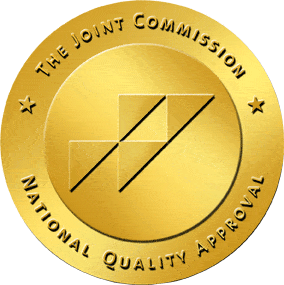
Magnolia Creek holds top-level accreditation from The Joint Commission, ensuring the highest quality care for every client.
Nurturing recovery through hands-on culinary experiences that build confidence, resilience, and lifelong healing.
Ongoing support through aftercare planning and alum connections to sustain recovery beyond treatment.
Addressing co-occurring mental health and substance use disorders with specialized, dual diagnosis treatment.
Experience the serenity of Magnolia Creek
Our tranquil campus — featuring peaceful gardens, wooded trails, and cozy lakeside spaces — provides the perfect setting for clients to reconnect with themselves and embrace their journey toward recovery.
what our clients say
Voices from Our Community

Resources
What's holding you back from seeking treatment?
Alycia Aldieri, head of admissions for Magnolia Creek, draws from her own recovery journey as she explores the most common roadblocks to eating disorder treatment.
outcomes at magnolia creek
Proven Results. Real Recovery.
We measure what matters. At Magnolia Creek, we track progress at every stage — helping clients make real change, sustain recovery, and reclaim their lives. Explore our outcomes and see how healing happens.
Download the 2024 Magnolia Creek Outcomes Report to see measurable progress from our treatment programs.
Verify Your Insurance
Renew your hope at Magnolia Creek.
Contact us today or complete our form to connect with an admissions specialist who will guide you to the right program. Healing is just a call away.
Your privacy is our priority. All communication is completely confidential.

